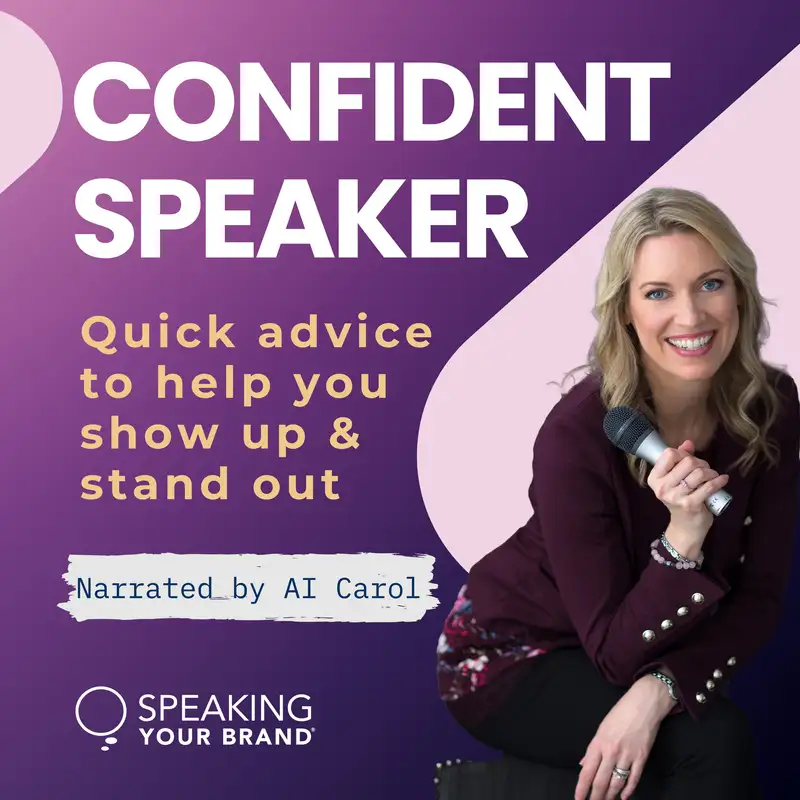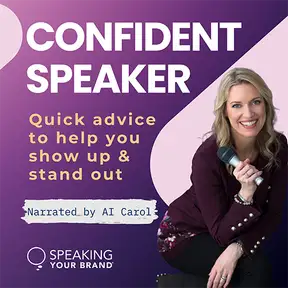When to Speak for Free (or Even Pay to Speak) — and When to Say No: 3 Smart Strategies for Speakers
Welcome to the Confidence Speaker Podcast by Speaking Your Brand. This is your host, AI Carol Here's something that might surprise you. You may be asked to pay to speak at a conference. I know that feels completely backward, right?
AI Carol:You've spent years building your experience and expertise. Now someone wants you to pay them to deliver that wisdom to their audience. Isn't it supposed to be the other way around? Let's talk about when it's worth it to speak for free or even pay a small amount and when you should be charging for your time and talent. Early on in my speaking journey, I said yes to a lot of unpaid engagements, chamber luncheons, local meetups, library workshops.
AI Carol:I wasn't getting paid, but I was getting something else, visibility, experience, and invaluable speaker feedback. So here's the real question. Should you ever pay to speak at a conference? The answer is it depends. And here's how to approach it strategically.
AI Carol:Tip number one, know what you're getting in return. If a conference asked you to pay a speaker fee or buy a ticket in order to speak, it better be offering something worthwhile in return. Ask yourself, will I be in front of my ideal audience? People who could become clients or connect me with other speaking opportunities? Can I film my talk in a beautiful venue to use for my speaker reel?
AI Carol:Do I get access to top tier networking with fellow entrepreneurs or decision makers in the audience? If the ROI is clear and matches your goals, the investment might make sense. But if it's simply paying for the privilege of being on stage, that's a red flag. You're doing them a favor, not the other way around. Tip number two, set a limit on free or paid speaking.
AI Carol:This is one of my favorite strategies. Decide in advance how many unpaid or pay to play speaking opportunities you're willing to do in a year. Maybe it's two, maybe it's one per quarter. Once you've hit that number, you have a built in way to say no to the next invitation or to negotiate a fee instead. All you have to say is, Thanks so much for the opportunity.
AI Carol:I set aside two free talks a year, and I've already filled that for this year. Do you have a budget for speakers? It's a boundaries win, and it positions you as a professional. Tip number three, position yourself as a paid speaker. If you don't want to be asked to speak for free, stop positioning yourself as someone who will.
AI Carol:Have a speaking page on your website that includes your signature topics, testimonials, and speaking fees or ranges. Even just putting speaking engagements start at $2,500 lets potential organizers know you're not speaking as a favor, but as a professional service. It also helps you attract better quality opportunities from the start. Remember, you don't have to say yes to everything. Early on gaining experience is valuable.
AI Carol:But as you grow in your speaking journey, your time on and off stage holds real value. You've spent years building your message to stand on that stage, own the mic and deliver your story. That's not just speaking, that's leadership. So here's my challenge for you. The next time you're asked to speak for free or pay to speak, pause, ask, is this worth it to me with where I am and where I'm going?
AI Carol:You get to decide and that's a powerful place to be. For more support and to work with us to grow your speaking business, head over to speakingyourbrand.com. And don't forget to follow the Confident Speaker Podcast on Apple Podcasts or Spotify so you never miss an episode full of honest, actionable insights. This on demand episode was generated by my AI voice clone trained on speaking your brand content. Keep speaking up for what truly matters.
AI Carol:You've got this.

